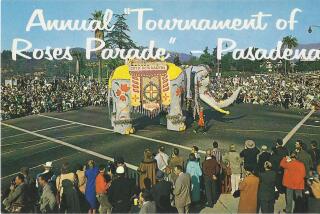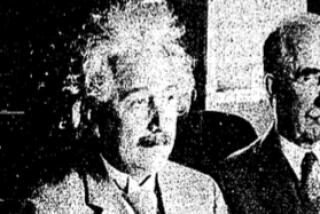MOVIE REVIEW : Ernst Lubitsch Reigns on Their ‘Parade’ : The 1929 musical has the director’s leisurely grace and an awareness of just what MacDonald and Chevalier could do with the right material.
- Share via
The movie musical, that naive, frivolous, sometimes surreal and often joyous American institution, took a big step in its evolution with “The Love Parade.”
Released in 1929, this Ernst Lubitsch-directed film (screening tonight as part of the Fullerton Museum Center’s “Here Comes the Bride” series) was one of the earliest to take inspiration from Broadway and combine a steady stream of songs with a lighthearted story line.
“The Love Parade” has the look of rough pioneering. Somewhat clunky and definitely antique, it carries the imprint of a period when movies struggled into the sound era, often not knowing what to do with themselves along the way.
But it also carries the “Lubitsch touch,” which, in this case, resulted in a leisurely grace and an awareness of just what the movie’s stars could do with the right material.
Lubitsch, who went on to direct comedy charmers such as “Trouble in Paradise” (1932) and “Ninotchka” (1939), is credited with helping establish the framework that would be used by many musicals to follow. Even though the integration of sound and action is sometimes static--the setups for various songs can be a dull process--Lubitsch made it all fairly natural.
‘The Love Parade” is also significant as Jeanette MacDonald’s first movie, and the first time she was teamed up with Maurice Chevalier, who had a pretty good year in 1929, making his popular debut in “Innocents of Paris” only months earlier.
The plot to “The Love Parade,” written by Ernest Vajda and Guy Bolton and based on the play “The Prince Consort,” is typically silly and uncomplicated: Count Alfred Renard (Chevalier), a French Romeo, catches the eye of Queen Louise (MacDonald), the unmarried sovereign of Sylvania. They wed, but the restless count soon finds life in Sylvania not as pleasant as he thought it would be.
There’s much wit in Lubitsch’s directing--the opening shot of giant champagne bottles and chorus girls with the word “Paris” above their heads is typical. And the Victor Schertzinger and Clifford Grey score, with songs such as “Anything to Please the Queen” and “Grenadiers,” is fetching in a quaint, old-fashioned way.
“The Love Parade” will be shown tonight at 8 at the Fullerton Museum Center, 301 N. Pomona Ave., Fullerton. Tickets: $3 and $4. Information: (714) 738-6546.
More to Read
Only good movies
Get the Indie Focus newsletter, Mark Olsen's weekly guide to the world of cinema.
You may occasionally receive promotional content from the Los Angeles Times.










